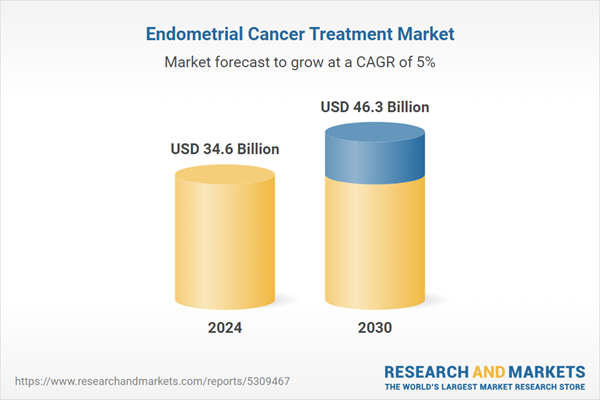Global Endometrial Cancer Treatment Market - Key Trends and Drivers Summarized
How Is Endometrial Cancer Treatment Revolutionizing Women's Health and Oncology?
Endometrial cancer treatment is revolutionizing women's health and oncology by providing increasingly effective, personalized, and less invasive options for managing one of the most common gynecological cancers. Endometrial cancer, which affects the lining of the uterus, is typically diagnosed in postmenopausal women and has seen rising incidence rates due to factors like obesity and aging populations. Advances in treatment are significantly improving survival rates and quality of life for patients. From surgery and radiation to hormone therapy and targeted treatments, the landscape of endometrial cancer care is evolving rapidly. Surgical techniques, particularly minimally invasive procedures like laparoscopic and robotic-assisted surgery, allow for precise removal of cancerous tissues with shorter recovery times and fewer complications. Additionally, the advent of targeted therapies and immunotherapy is offering new hope for patients with advanced or recurrent endometrial cancer, tailoring treatment to the specific genetic makeup of their tumors. This shift towards personalized medicine is making endometrial cancer treatment more effective and patient-centered, transforming outcomes and setting new standards in oncology.What Innovations Are Enhancing the Treatment of Endometrial Cancer?
Innovations in the treatment of endometrial cancer are enhancing care through advancements in surgical techniques, targeted therapies, and genetic testing. One of the most significant developments is the improvement in minimally invasive surgical methods, such as laparoscopic and robotic-assisted surgeries, which allow for the precise removal of tumors with less damage to surrounding tissues. These techniques reduce postoperative pain, shorten hospital stays, and lead to quicker recoveries, making surgery a less daunting option for many patients. Another key innovation is the introduction of targeted therapies, which attack specific molecules involved in cancer growth and progression. For instance, therapies targeting the PI3K/AKT/mTOR pathway, commonly altered in endometrial cancer, are showing promise in clinical trials. These treatments offer a more personalized approach, particularly for patients with advanced disease or those who do not respond well to conventional therapies. Additionally, immunotherapy is emerging as a powerful tool in treating endometrial cancer, harnessing the body's immune system to fight cancer cells more effectively. Genetic testing and molecular profiling of tumors are also playing a critical role in treatment planning, allowing oncologists to identify specific mutations and select therapies that are most likely to be effective for individual patients. These innovations are making endometrial cancer treatment more precise, less invasive, and better tailored to the needs of each patient, significantly improving outcomes and quality of life.How Does Endometrial Cancer Treatment Impact Patient Outcomes and Quality of Life?
Endometrial cancer treatment has a profound impact on patient outcomes and quality of life by offering more effective and less invasive options that lead to better long-term health and well-being. Early-stage endometrial cancer is often highly treatable, with surgery being the primary mode of treatment. Advances in surgical techniques, such as laparoscopic and robotic-assisted procedures, minimize the physical and emotional toll on patients, leading to faster recoveries and fewer complications compared to traditional open surgeries. For patients with more advanced or recurrent cancer, the introduction of targeted therapies and immunotherapy is improving survival rates and offering new hope where options were previously limited. These treatments are not only extending life but also improving its quality by reducing the side effects associated with more aggressive treatments like chemotherapy and radiation. Hormone therapy, often used in cases where surgery is not an option, offers another less invasive treatment pathway that can effectively manage the disease while preserving fertility in younger women. By focusing on the specific needs and circumstances of each patient, modern endometrial cancer treatment is enhancing the overall experience, ensuring that patients not only live longer but also maintain a higher quality of life throughout and after their treatment journey.What Trends Are Driving Growth in Endometrial Cancer Treatment?
Several trends are driving growth in endometrial cancer treatment, including the increasing prevalence of the disease, advancements in personalized medicine, and the growing focus on minimally invasive treatment options. The rising incidence of endometrial cancer, driven by factors such as aging populations and the obesity epidemic, is leading to greater demand for effective treatment options. This has spurred investment in research and development, resulting in new therapies and surgical techniques that are more effective and less burdensome for patients. The shift towards personalized medicine is also a significant driver, as genetic testing and molecular profiling of tumors allow for more tailored treatment strategies. This approach not only improves the effectiveness of treatment but also reduces unnecessary side effects, making it more appealing to patients and healthcare providers alike. Additionally, there is a growing emphasis on minimally invasive treatments, driven by patient demand for options that offer quicker recovery times and fewer complications. Innovations in robotic surgery and targeted therapies are making these options more widely available and effective. Finally, the increasing use of immunotherapy in oncology is expanding treatment possibilities for endometrial cancer, particularly for patients with advanced or resistant forms of the disease. These trends are reshaping the landscape of endometrial cancer treatment, offering new hope and improved outcomes for patients while driving growth in the market for innovative therapies and technologies.Report Scope
The report analyzes the Endometrial Cancer Treatment market, presented in terms of market value (USD). The analysis covers the key segments and geographic regions outlined below.- Segments: Product (Chemotherapy, Hormone therapy).
- Geographic Regions/Countries: World; United States; Canada; Japan; China; Europe (France; Germany; Italy; United Kingdom; and Rest of Europe); Asia-Pacific; Rest of World.
Key Insights:
- Market Growth: Understand the significant growth trajectory of the Chemotherapy segment, which is expected to reach US$31.3 Billion by 2030 with a CAGR of 4.7%. The Hormone therapy segment is also set to grow at 5.5% CAGR over the analysis period.
- Regional Analysis: Gain insights into the U.S. market, valued at $9.5 Billion in 2024, and China, forecasted to grow at an impressive 4.9% CAGR to reach $7.4 Billion by 2030. Discover growth trends in other key regions, including Japan, Canada, Germany, and the Asia-Pacific.
Why You Should Buy This Report:
- Detailed Market Analysis: Access a thorough analysis of the Global Endometrial Cancer Treatment Market, covering all major geographic regions and market segments.
- Competitive Insights: Get an overview of the competitive landscape, including the market presence of major players across different geographies.
- Future Trends and Drivers: Understand the key trends and drivers shaping the future of the Global Endometrial Cancer Treatment Market.
- Actionable Insights: Benefit from actionable insights that can help you identify new revenue opportunities and make strategic business decisions.
Key Questions Answered:
- How is the Global Endometrial Cancer Treatment Market expected to evolve by 2030?
- What are the main drivers and restraints affecting the market?
- Which market segments will grow the most over the forecast period?
- How will market shares for different regions and segments change by 2030?
- Who are the leading players in the market, and what are their prospects?
Report Features:
- Comprehensive Market Data: Independent analysis of annual sales and market forecasts in US$ Million from 2024 to 2030.
- In-Depth Regional Analysis: Detailed insights into key markets, including the U.S., China, Japan, Canada, Europe, Asia-Pacific, Latin America, Middle East, and Africa.
- Company Profiles: Coverage of players such as Curasight A/S, Dheeraj Bojwani Consultants, Erasmus MC, F. Hoffmann-La Roche AG, Florida Cancer Specialists and more.
- Complimentary Updates: Receive free report updates for one year to keep you informed of the latest market developments.
Some of the 38 companies featured in this Endometrial Cancer Treatment market report include:
- Curasight A/S
- Dheeraj Bojwani Consultants
- Erasmus MC
- F. Hoffmann-La Roche AG
- Florida Cancer Specialists
- ITM Isotopen Technologien Munchen AG
- Merck & Co., Inc.
- Premium Europe
- Providence Therapeutics Holdings Inc.
This edition integrates the latest global trade and economic shifts into comprehensive market analysis. Key updates include:
- Tariff and Trade Impact: Insights into global tariff negotiations across 180+ countries, with analysis of supply chain turbulence, sourcing disruptions, and geographic realignment. Special focus on 2025 as a pivotal year for trade tensions, including updated perspectives on the Trump-era tariffs.
- Adjusted Forecasts and Analytics: Revised global and regional market forecasts through 2030, incorporating tariff effects, economic uncertainty, and structural changes in globalization. Includes historical analysis from 2015 to 2023.
- Strategic Market Dynamics: Evaluation of revised market prospects, regional outlooks, and key economic indicators such as population and urbanization trends.
- Innovation & Technology Trends: Latest developments in product and process innovation, emerging technologies, and key industry drivers shaping the competitive landscape.
- Competitive Intelligence: Updated global market share estimates for 2025, competitive positioning of major players (Strong/Active/Niche/Trivial), and refined focus on leading global brands and core players.
- Expert Insight & Commentary: Strategic analysis from economists, trade experts, and domain specialists to contextualize market shifts and identify emerging opportunities.
Table of Contents
Companies Mentioned (Partial List)
A selection of companies mentioned in this report includes, but is not limited to:
- Curasight A/S
- Dheeraj Bojwani Consultants
- Erasmus MC
- F. Hoffmann-La Roche AG
- Florida Cancer Specialists
- ITM Isotopen Technologien Munchen AG
- Merck & Co., Inc.
- Premium Europe
- Providence Therapeutics Holdings Inc.
Table Information
| Report Attribute | Details |
|---|---|
| No. of Pages | 192 |
| Published | February 2026 |
| Forecast Period | 2024 - 2030 |
| Estimated Market Value ( USD | $ 34.6 Billion |
| Forecasted Market Value ( USD | $ 46.3 Billion |
| Compound Annual Growth Rate | 5.0% |
| Regions Covered | Global |









